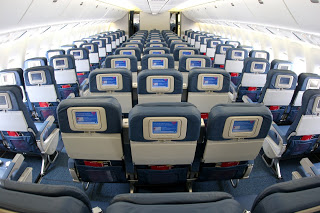PART 10
ALERT TO THE CROSS-COUNTRY TRAVELER IN LATE 2010—there are no Starbucks along I-80. Nor is National Public Radio available except in mere sputterings, especially through the Paleozoic-era standard issue radio in a Toyota Corolla rented through Thrifty Rental Cars. What I wouldn’t give right now for an Americano. And poor Cheryl, the Coffee Queen…she hasn’t had a real latte since Logan International. Truck-stop culture along a major interstate artery is only one reason why the creature, over-stuffed comforts facilitated by baristas are hard to come by. The other is Joe and others of his adolescent ilk—are they called EMOs now?–who can only orient themselves through fast food chains. Why our orientation in late 2010 as adults seems only to come through the Corporation for Public Broadcasting and a coffee shop named after Captain Ahab’s first officer in Moby Dick is another matter.
Right?
By the time we reach the Mississippi River, I have given up looking for what I thought was the ubiquitous long-haired seafarer embedded in the green medallion and looking like he’s off a tarot card. This is the mind-numbing part of travel. It’s so easy to start expecting nothing more than what is offered. It was a phenomenon the airline industry tried (and continues to try) to buck ever since People’s Express first flared up (and fizzled) on the horizon of de-regulation in the mid-80s, chiefly wrought by economist Alfred E. Kahn, who coincidentally died the night before we left Maine for our trip west. “The verdict of the great majority of economists would, I believe, be that deregulation has been a success….” wrote Kahn. Of course I don’t remember that he ever wrote about the costs which the flight attendants and other front-line airline employees would have to shoulder as we mid-wifed the surge of new American fliers through the aluminum “O”s coast-to-coast through hub and spoke systems and the tyranny of security checks. “…–bearing in mind,” Kahn would continue in that demi-god way that academics have when they’re fucking around with policy “as always, the central argument … that society’s choices are always between or among imperfect systems, but that, wherever it seems likely to be effective, even very imperfect competition is preferable to regulation….”[9]
I had donned my wings and taken to slinging hash down the aisle of a B727 some few years after all this nonsense started, and there we were, at 30,000 feet and competing with United and American Airlines and the other “legacy” carriers to stay aloft and not get trounced by the start-ups along with our eternal nemesis, Southwest Airlines. This while air travel increased exponentially. Everyone seemed to be lining up with their bulging carry-ons, their baby strollers, their wheelchairs—businessmen dangling their suit coats at you in first class to be hung up so that they could get to their pre-flight cocktail. It took everyone twenty years to figure out that like everything else in America, its people felt entitled to have their cake and eat it too. Amenities like “free champagne in free fall” (to quote one of David Letterman’s “Top Ten” after a spate of incidents on Delta) and reserved seating… but not for anything more than bus fare, or a few Sky Miles for an upgrade. And the airlines, fearful of becoming another Braniff, Eastern or—horrors!—another re-organized Continental through Satan himself (CEO Frank Lorenzo)—played right along. Following the whims of a fickle public that couldn’t get to cruising altitude without opening a screen of some sort; that wrangled frequent flier miles; that demanded non-stop…everything. Yes, we (as in the industry) followed suit. Putting hot meals on, then taking them back off. Dressing the flight attendants in casual, open-throated blues then putting them back into formal ties and dresses with scarves. Assembling focus groups to figure out what kind of bourbon would sell best. Replacing the pillow packs of MJB with Starbucks—of course!—but making you pay for it by charging to check your luggage.
I suppose at my age–approaching the half-century mark—that you can’t get through a career in any sector without arriving at the conclusion that the system reigns supreme. It’s what will always reign in the end in its loping, persistent way. The only thing that makes sense, really, is to be The Economist, like Kahn, looking down at the “imperfect systems” with the kind of detachment that still allows you to play golf that weekend.
And what is that to us, the bumbling threesome left to wend our way west out of a catastrophic –but inevitable, it seems—systemic failing? Now, instead of our markers being chimes in the cabin indicating turbulence, gradual and final descent, it is the mighty Mississippi spread out before us and the rumble of four tires as we cross the bridge. In the night, lights along the shore speak to another time when the slow water ways of the country told a story that seems, at least in retrospect, more manageable, cleaner. A system characterized by the ponderous and thoughtful sound of a paddle wheel or the chugging of a steam engine. The lights on the far shore hold that thought for me as we intersect the country’s greatest drainage where the twenty-one year old Samuel Clemens repeatedly shouted “mark twain!” as a “cub” steamboat pilot. “If I have seemed to love my subject, it is no surprising thing,” he once wrote. “…for I loved the profession far better than any I have followed since, and I took a measureless pride in it. The reason is plain: a pilot, in those days, was the only unfettered and entirely independent human being that lived in the earth.”
I used to feel that way about being a flight attendant. And while the outbreak of the Civil War ended that freeing profession for Clemens, September 11, 2001 seemed to end mine for me.
There is fog on the Illinois/Iowa state line. And being in an internal (and eternal) state of counting the miles, we now seem in this soup to be spinning our wheels. Thanks to the car radio, there is more rock and roll here at the end of our exhausting day with Rock Hall now nearly 500 miles behind us, including Stevie Wonder’s rendition of the old standard “Rainy Night in Georgia.” Earlier we had stopped for dinner at “R Place,” a rambling family restaurant attached to a truck stop just west of Joliet, IL in the city of Morris and famous, apparently for its hubcap tenderloin, which I will leave you, dear reader, to figure out why it is called thusly. The place is filled with collectibles, many sandwiched under the glass top of the booth we sat in. After returning the menu to “Barb” who, typical of her sisterhood is chewing gum and pointing out the specials with a practiced patience that I have never trusted, I notice an old black-and-white photo directly below where my plate will rest. It is the profile card of a young, swarthy-looking man being booked into the Erie County (NY) Penitentiary. He stands, according to the card, at 5’1”. There are other stats penciled into boxes on the abbreviated form that mean nothing to me. Most telling, however, is the expression in his face of utter compliance. It’s a face that tells of a time when having one’s picture taken—most likely the first image of him—was utterly unique. A face filled with wonder at a technology that, while it was going to literally imprison you, the process of the system was nevertheless utterly captivating. The expression of a man who is curiously honored to be the subject of a gizmo he cannot comprehend.
Barb arrives with catfish for Cheryl and me, a bacon cheeseburger with bleu cheese for the man-boy. Barb has the doughy look of someone who waits tables in a place famous for its bakery, a menu in which the term “vegetarian” is un-American and where all fish must be dipped in batter. But she is sympathetic to our plight which Cheryl shares as Barb stands and takes a short break. It would seem that several years back when our waitress lived in California, she spent over thirty-five thousand dollars returning to Illinois to care for her cancer-ridden father who, as fathers all eventually do, cancer-ridden or not, eventually died. Finally, when the flights became too expensive, she started driving the distance, only to learn that Sundays are dry in Nebraska and that Iowa’s isn’t much better, sporting its own weird blue laws.
R Place takes on a warmth because of Barb and we listen thoughtfully over bite-fuls to a brief history of this place, a museum unto itself, its primary collection being that of old toys: dolls, and rusted bikes, jacks and curious games all of which is woefully curated but fascinating in a pass-by way.
Joe finishes his burger and heads back to the bathroom before we leave and Barb returns with our check.
“I didn’t know that I would ever end up back in Illinois, she says, continuing a conversation interrupted regularly by the duties of diner world. “But here I am and it was because I cared about my dad so much.”
“Was it worth it?” I ask at the risk of Cheryl possibly kicking me under the table. (Is my negativity showing?)
Barb thinks for a minute, one arm folded across her ample bosom, the other in a pocket of her soiled apron. The family next to us is shambling out of the booth and she turns to thank them. Everyone here in this gluttonous space between Christmas and New Year’s seems gargantuan to me, men and women, mother and dads even grandparents are swathed in cotton Ts, levis and the ubiquitous shodding of “tennis shoes”—giant winter coats that make them all, in the argot of the day, even more “ginormous.” She thanks them again for their business, then turns to us with a sigh. “I don’t know yet. It’s only been 12 years since I came back for Dad. Maybe I’ll know when you come back this way to R Place. Maybe I’ll know by then.”

